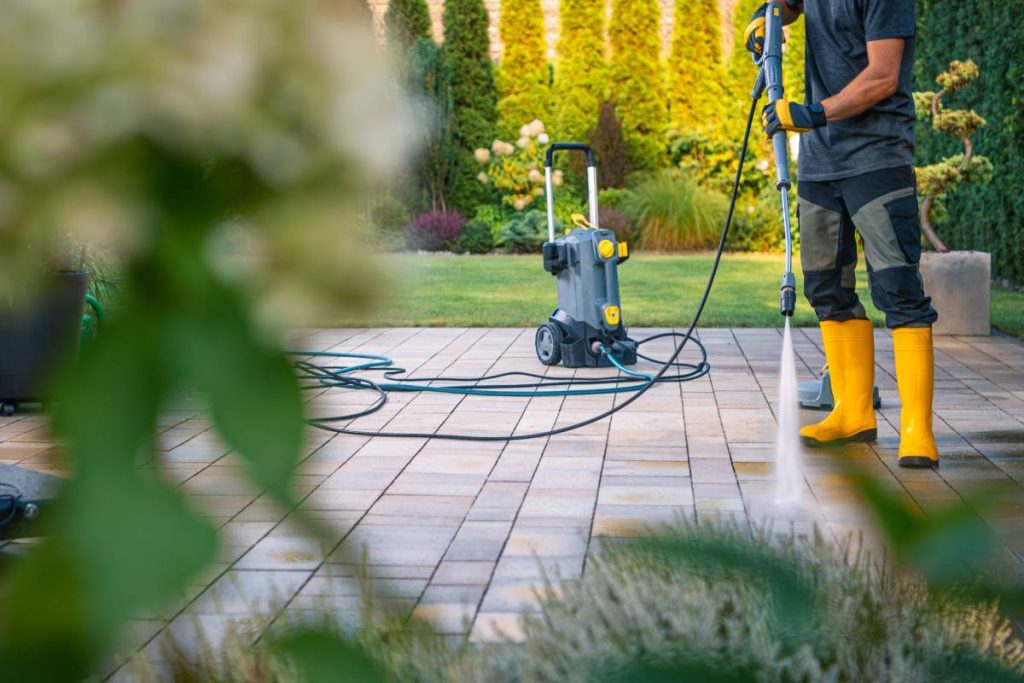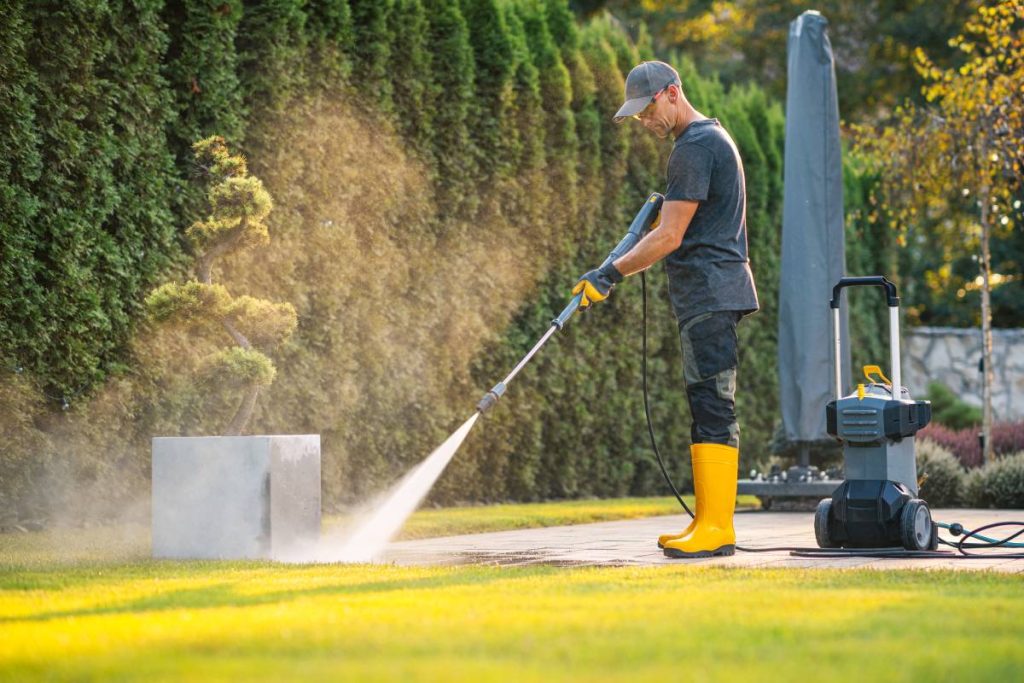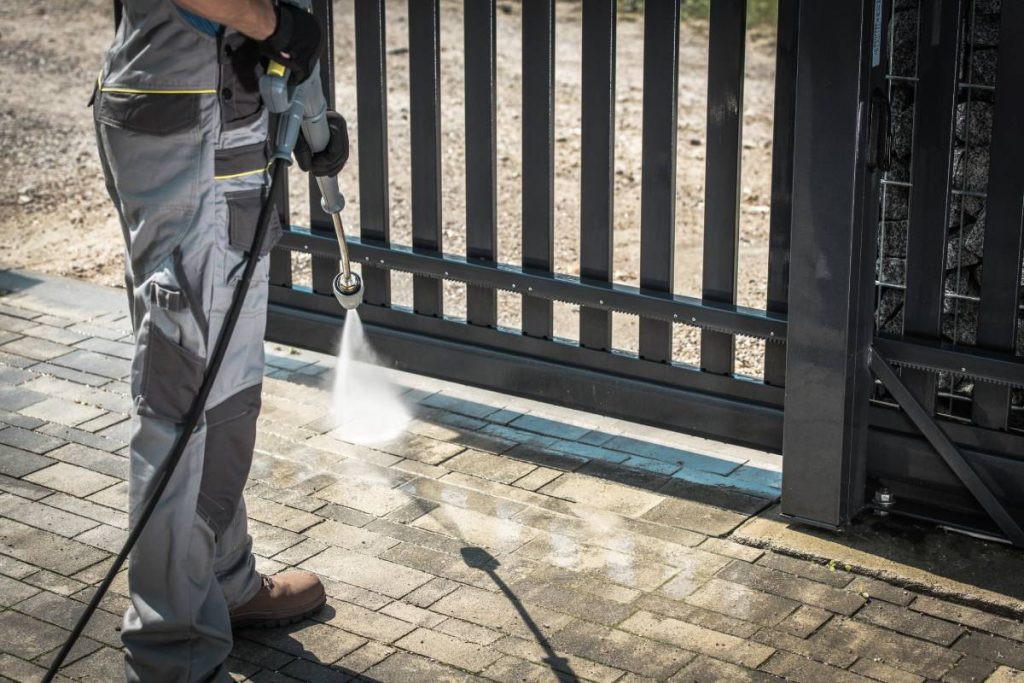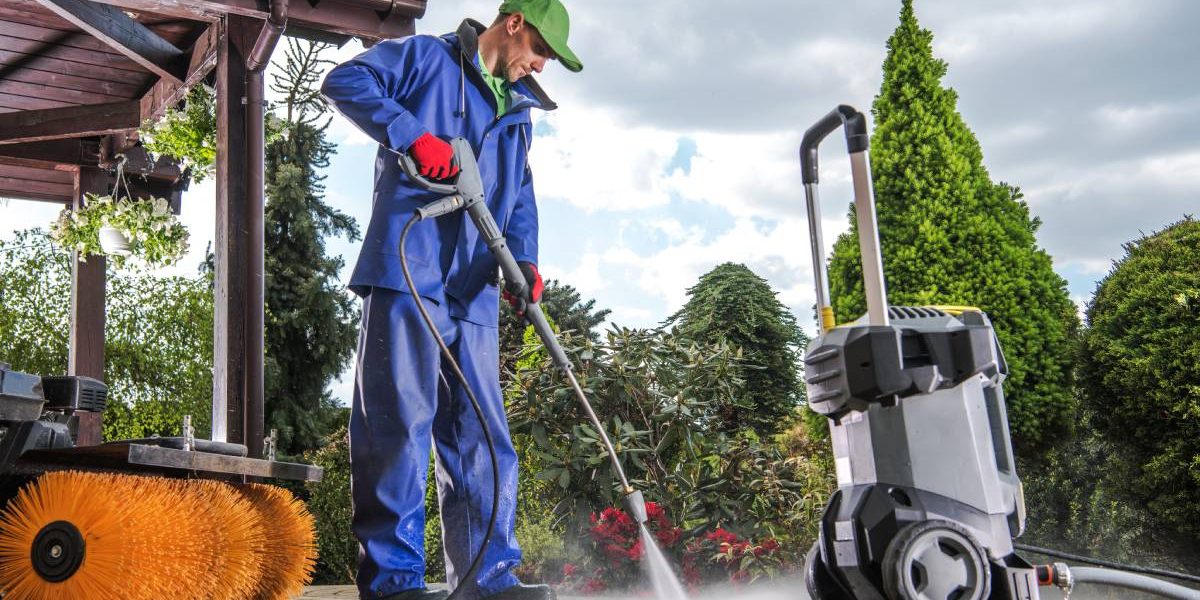When it comes to cleaning outdoor surfaces, power washers and pressure washers are two of the most effective tools available. Both devices use pressurized water to remove dirt, grime, mould, and other debris from surfaces, but they are not identical.
Understanding their differences can help you choose the right tool for your cleaning needs and ensure that your surfaces are cleaned effectively without unnecessary damage.
You might also read:
What Is a Pressure Washer?
A pressure washer is a cleaning device that uses a motor—either electric or gas-powered—to pressurize water and shoot it through a nozzle. The high-pressure stream of water can dislodge dirt, grime, and other debris from surfaces like driveways, decks, patios, and siding. Pressure washers are versatile tools suitable for most residential cleaning tasks.
Key Features of Pressure Washers
- Pressure Levels: Pressure washers typically operate at pressures between 1,300 and 3,000 PSI (pounds per square inch), making them suitable for tasks ranging from light cleaning to more demanding jobs.
- Water Temperature: Pressure washers use cold or room-temperature water, which makes them ideal for general cleaning but less effective on greasy or oily surfaces.
- Nozzles and Attachments: Pressure washers come with a variety of nozzles that control the water’s spray pattern, ranging from narrow streams for tough grime to wider fans for gentle cleaning.
- Portability: These machines are often lightweight and easier to manoeuvre, especially the electric models, making them a popular choice for homeowners.
What Is a Power Washer?
A power washer is similar to a pressure washer in design and function but includes one significant difference: it heats the water. Power washers use hot water to enhance cleaning efficiency, particularly for removing stubborn stains, grease, and mould. The combination of heat and pressure makes power washers more suitable for industrial or heavy-duty cleaning tasks.

Key Features of Power Washers
- Pressure and Heat: Power washers operate at similar pressures to pressure washers but include a heating element to warm the water.
- Cleaning Effectiveness: The hot water helps dissolve grease, oil, and other tough stains that cold water struggles to remove.
- Size and Weight: Due to the heating element and often larger engines, power washers tend to be bulkier and heavier than pressure washers.
- Applications: Power washers are better suited for industrial environments, commercial cleaning, and tackling extremely dirty surfaces.
Key Differences Between Power Washers and Pressure Washers
While the terms “power washer” and “pressure washer” are sometimes used interchangeably, they are distinct tools with unique advantages. Let’s break down their differences:
1. Water Temperature
- Pressure Washers: Use cold or room-temperature water.
- Power Washers: Heat the water, which can reach temperatures of up to 200°F.
- Impact: The heated water in power washers is more effective at breaking down grease, oil, and other stubborn substances, while pressure washers rely solely on water pressure.
2. Cleaning Applications
- Pressure Washers: Ideal for residential use, such as cleaning cars, driveways, decks, and outdoor furniture.
- Power Washers: Best for industrial and commercial tasks, such as cleaning construction equipment, removing graffiti, or washing oil-stained concrete.
- Impact: Power washers can handle jobs that require deep cleaning and sanitation, whereas pressure washers are better for everyday cleaning tasks.
3. Cost
- Pressure Washers: Generally more affordable, with prices ranging from $100 to $500, depending on the model and specifications.
- Power Washers: Tend to be more expensive due to the added heating element, with prices starting around $500 and reaching $2,000 or more for high-end models.
- Impact: For budget-conscious buyers, a pressure washer may be the better option unless hot water is essential for the task.
4. Maintenance
- Pressure Washers: Easier to maintain due to fewer components.
- Power Washers: Require additional maintenance for the heating element and fuel system if gas-powered.
- Impact: Pressure washers are simpler to own and maintain, while power washers demand more care to ensure proper functionality.
5. Portability
- Pressure Washers: More portable and easier to store, especially electric models.
- Power Washers: Bulkier and harder to transport due to their heating systems and heavier build.
- Impact: For users who need mobility and convenience, pressure washers are the better choice.

Which Tool Is Right for You?
Choosing between a power washer and a pressure washer depends on your cleaning needs, budget, and the type of surfaces you’ll be cleaning. Here are some factors to consider:
Residential Cleaning
For homeowners looking to clean patios, driveways, vehicles, and siding, a pressure washer is usually sufficient. It’s cost-effective, easy to use, and powerful enough for most household tasks. Additionally, the variety of nozzles and attachments available allows you to tailor the machine to different surfaces.
Commercial and Industrial Cleaning
If you’re dealing with heavy-duty cleaning tasks, such as removing oil stains, grease, or mould from large surfaces, a power washer is the better choice. The combination of heat and pressure makes it more effective for these challenging jobs. While the initial investment is higher, the improved cleaning efficiency can save time and effort in the long run.
Surface Type
- Delicate Surfaces: Pressure washers are safer for cleaning wood, glass, and painted surfaces because they don’t use heated water.
- Hard and Stubborn Surfaces: Power washers excel at cleaning concrete, brick, and metal surfaces stained with grease or heavy grime.

Safety Considerations
Both power washers and pressure washers are powerful tools that require proper handling to avoid damage to surfaces and injury to the operator. Here are some tips:
- Wear Protective Gear: Always wear safety goggles, gloves, and sturdy shoes when operating these machines.
- Test the Pressure: Start with the lowest pressure setting and gradually increase it to avoid damaging surfaces.
- Use the Right Nozzle: Choose the appropriate nozzle for the task to ensure effective cleaning without causing harm.
- Be Cautious with Power Washers: The hot water can cause burns or damage sensitive materials if not handled properly.
Conclusion
While power washers and pressure washers share similarities, their differences in water temperature, cleaning applications, cost, and maintenance set them apart. Pressure washers are perfect for everyday cleaning tasks around the home, offering a cost-effective and convenient solution. On the other hand, power washers are designed for heavy-duty, industrial, and commercial use, providing superior cleaning power for tough jobs.
By understanding the distinctions between these tools, you can make an informed decision that ensures your surfaces are cleaned effectively and efficiently. Whether you need to remove grime from a patio or tackle grease-stained machinery, there’s a washer designed to meet your needs.











